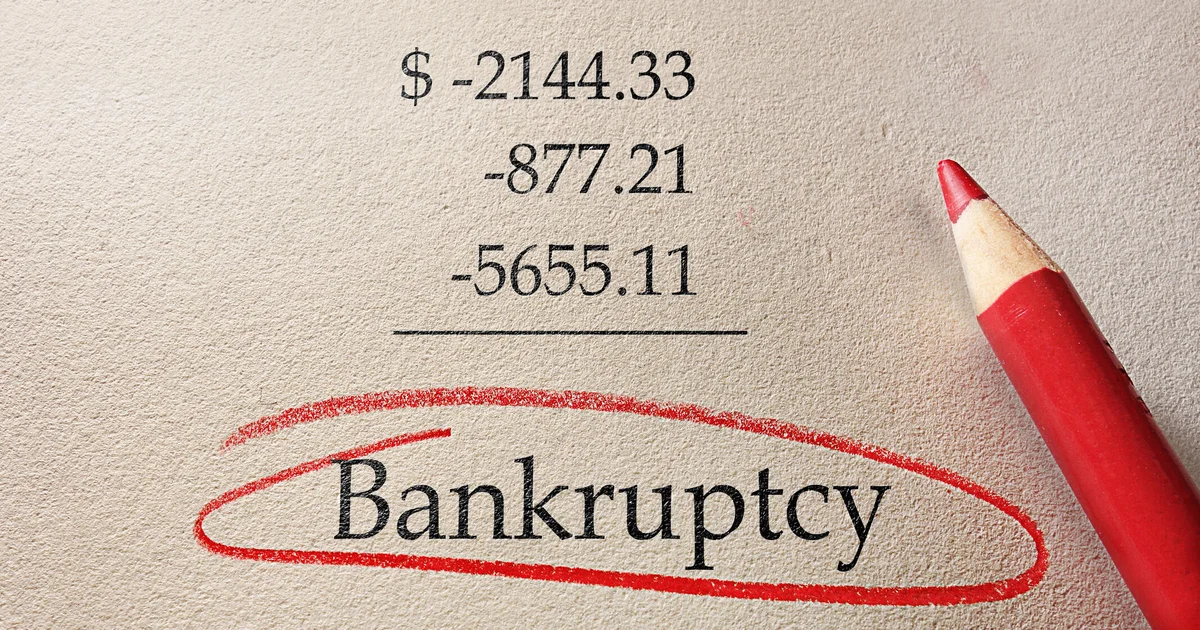Copyright CBS News

Filing for bankruptcy isn't a decision that most people take lightly, and for good reason. Not only does a bankruptcy have a significant impact on your finances, but you must also meet specific requirements to qualify for this type of relief. if you're struggling to keep up with bills, dodging calls from debt collectors or watching your balances spiral despite making monthly payments, however, bankruptcy might seem like the only way out. And, for many, filing for Chapter 7, which is often referred to as liquidation bankruptcy, is the preferred option because it can discharge eligible debts quickly without requiring a repayment plan. But not everyone qualifies for Chapter 7. To prevent abuse of the system, a screening process, called the means test, is required, which looks at your income, expenses and household size to determine whether you truly can't afford to pay off your debts. If your income is too high, you may not pass. So what happens if you fail the Chapter 7 means test? Fortunately, it's not the end of your options, but there are some things you should know, especially in terms of what to do next. Learn how to take control of your overwhelming debt today. What happens if you fail the Chapter 7 bankruptcy means test? Failing the means test simply means your income is too high to qualify for Chapter 7 under the current guidelines. The test is designed to ensure that Chapter 7 is reserved for people who genuinely can't repay their debts. So, if your monthly income exceeds the median for your state and household size and you don't have enough qualifying expenses to reduce that figure, you may be considered ineligible. When that happens, you generally have two options: Convert your bankruptcy to a Chapter 13 case or challenge the results and adjust your filing. Most people who fail the Chapter 7 means test end up filing under Chapter 13 instead. With a Chapter 13 bankruptcy, you won't wipe out your debt right away, but you can restructure it into a manageable repayment plan that lasts three to five years. At the end of that period, any remaining qualifying debts may be discharged. Chapter 13 is a better fit for individuals with regular income, especially if they want to keep certain assets that might otherwise be sold in a Chapter 7 case. In some cases, though, you may be able to pass the means test after all. However, it depends on how your income and expenses are calculated. For example, your income may have recently dropped, but if your average earnings over the past six months are still too high, that could skew the results. Or, you may be able to claim certain allowable expenses you initially overlooked, such as necessary medical care, child support or transportation costs. It's also worth noting that some bankruptcy filers are exempt from the means test entirely, like disabled veterans and individuals with primarily business-related debt. Working with a bankruptcy attorney can help you review your financials more closely and potentially identify a way to pass the test or re-file under more favorable circumstances. Find out how you can work with a debt relief expert to resolve your debt issues now. What are your alternatives when Chapter 7 isn't available? If changing your filing to Chapter 13 isn't ideal or if you're simply looking for alternatives to bankruptcy altogether, there are other strategies to consider. For example, many borrowers find success through debt relief programs, which may help you avoid the long-term consequences of a bankruptcy filing. If you want to take that route, here are a few options to explore: Debt settlement: With debt settlement, also known as debt forgiveness, you or a debt relief expert negotiates directly with your creditors to try and reduce the amount you owe. These programs roll your debts into a single monthly payment and can help you resolve your accounts faster, sometimes in just 24 to 48 months. While debt settlement can impact your credit, it may result in reducing your total balances by 30% to 50% or more. Debt management: If your biggest issue is high interest rates, a debt management plan could help. Offered through credit counseling agencies, debt management plans bundle your unsecured debts, like credit cards, into a structured repayment plan. The credit counselor will also work with your creditors to try and lower your rates and waive fees, making it easier to pay off your balances in full. Debt consolidation: If your credit score is still in decent shape, you might qualify for a low-rate loan to consolidate your debts. By rolling everything into a single loan at a lower interest rate, you can reduce your total monthly payments and simplify repayment. This option typically works best, though, if your financial situation is improving and you're not already deep in delinquency. The bottom line Failing the Chapter 7 means test doesn't mean you're doomed to live with debt forever. While it may be disappointing, it opens the door to other solutions, like Chapter 13, debt settlement or a managed repayment plan that can still lead you toward financial freedom. The key, though, is to act quickly. The longer you wait, the more late fees, penalties and interest charges can pile up. But with the right plan in place, you can move past this financial hurdle and start rebuilding your future.



